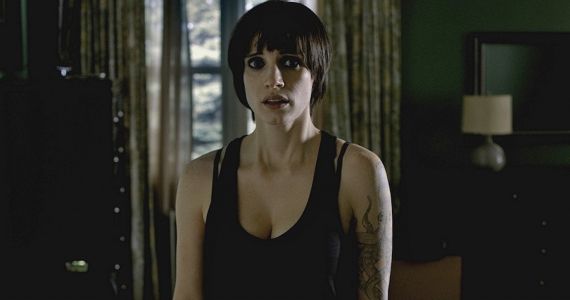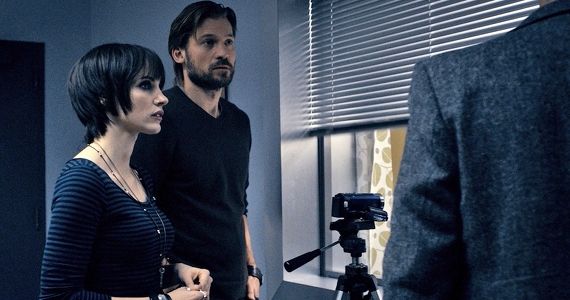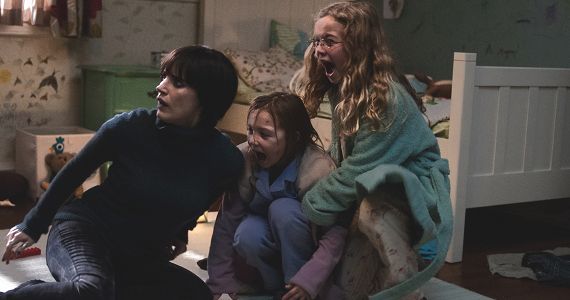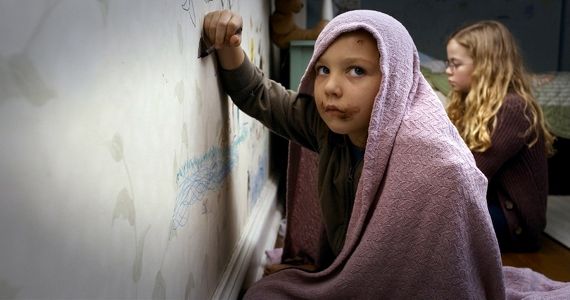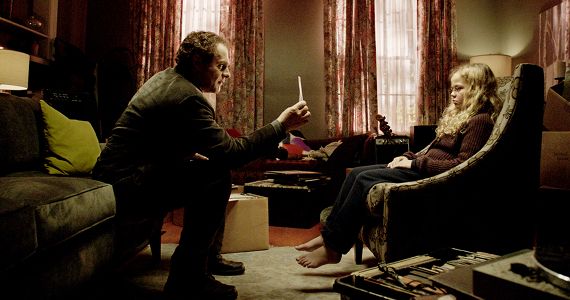What we do get is about 60 minutes' worth of very good and effective ghost story, made to look less attractive by the 40 minutes of fat hanging off of its middle.
Mama is the lastest horror movie to carry the prestigious stamp of being "presented by Guillermo del Toro" - following in the tradition of such films as The Orphanage (2007) and Don't Be Afraid of the Dark (2010). Mama tells the story of Victoria (Megan Charpentier) and Lilly (Isabelle Nélisse), two little girls whose tragic family history leaves them stranded in the woods for five years' time.
When their father's twin brother, Lucas (Game of Thrones star Nikolaj Coster-Waldau), finally tracks the girls down, it seems like the reunion is a small miracle; although Lucas' punk-rock girlfriend Annabel (Jessica Chastain) isn't too thrilled with the sudden shift from starving artist to maternal figure. It doesn't help things when Annabel begins to suspect that the girls may not have been fending for themselves out there in the woods. Something watched over them, and is still watching over them in their new home; an entity the girls only refer to (in secretive whispers) as "Mama."
Typically with these "del Toro presents" films, the acclaimed filmmaker uses his clout to both support a creepy/frightening tale that caught his macabre attention, while also helping to showcase the work of a freshman feature-film director. Stepping up to bat this time is Andrés Muschietti, the writer/director who made the 2008 Mama short film that this feature-length version is based on. Muschietti proves himself to be a visual and conceptual talent, and his film is definitely boosted by the talent of Chastain (in her pre-Oscar nom days) and the two young actresses who serve as its stars. However, while the concepts, acting and construction of the film all show hints of great skill, the execution of the storyline is where Mama fails to capitalize on its own potential.
In terms of direction, Mama is a pretty strong debut for Muschietti. The cinematography is dark but vibrant (full of earthen tones) and the sequences are all visualized and constructed in sharp, creative ways. Most of the film is confined to two locations (the woodland cabin where the girls are found and a house where Lucas, Annabel and the girls are living) but how Muschietti chooses to use these set pieces and the tight space therein is fairly smart and engaging most of the time. Instead of the usual 'calm by day, scary by night' progression, we instead get a lot of clever scare moments executed at all times of day (even broad daylight), using angles and framing to give even mundane moments (like doing laundry) a creepy edge.
Given the choice to use an ever-present antagonist (ghosts tend to lose their mystique the longer they hang around) and two child characters who are more unnerving than dangerous, Muschietti ultimately settles for a film that is consistently creepy, but only seldomly frightening. By the time the film reaches its over-blown conclusion, it has fully shifted from horror story to dark fairytale, and any scare-power it had in store ultimately dissipates into conventional drama. Despite that fizzle at the end, however, much of Mama is (as stated) pretty creepy.
A lot of that creepiness can be attributed to the young leads, Megan Charpentier and Isabelle Nélisse - who play Victoria and Lilly, respectively. As the older of the two, Charpentier has the more difficult task of being the conflicted sister, torn between memories of her past life and her time with "Mama." The part calls for some intense interrogation scenes with psychiatric professor Dr. Dreyfuss (Daniel Kash) and moments of both menace and childlike vulnerability. For a such young actress, Charpentier holds her end up well enough.
Since Lily spent most of her formative years in the woods, with no memory of life beforehand, Nélisse is given the much more fun task of playing the perennially creepy, snarling, untamed wild-child - a task she most definitely embraces wholeheartedly. Lilly will make you laugh, gross you out - and now and again, freak you out as well.
Nikolaj Coster-Waldau gets to have a bit of fun in his brief blips of screen time, playing both the half-mad father of the girls and the more sensible twin uncle; after certain developments unfold, he even gets a few moments worthy of a guest spot on House M.D. That is to say: this is mostly Chastain's show.
It's doubtful that Muschietti and Co. knew that their starlett would be such a big name by the time their movie was finally released, but aside from the extra star-power Chastain brings to the film, her quality acting skills carry a lot of the movie in between the girlie/ghostly scare moments. She's good enough that Annabel's arc from bitter babysitter to fierce lioness protecting her cubs is a solid and relatable through-line that grounds the half-cooked supernatural mythos.
"Half-cooked" is a term that can indeed be applied to much of Mama's narrative. The film is frustrating in the fact that the script - by Andrés, his sister Barbara, and TV scribe Neil Cross (BBC's Luther) - has a strong core story (the powerful effects of maternal instinct) and a great mythos built on top of that; solid foundations that the script totally undermines by adding too many extraneous bits.
Instead of focusing on Chastain and the girls, Mama in many ways presents us with three major story arcs - Annabel, Lucas and Dr. Dreyfus - only, by the end, one of those arcs has been tied-off abruptly and unsatisfyingly; another is abandoned completely, and the final one (as stated) spins right out of horror into full-on melodrama - but hey, at least it's completed in full, right? (FUN FACT: If you watch the Mama trailer after seeing the film (watch it below) you can actually find out the resolution to part of the story, which didn't actually make it into the theatrical cut.)
At 100 minutes run time, Mama isn't exactly epic in length - yet it still shows the sort of fatigue and confusion that can often appear when one tries to stretch a short film out to feature length (see also: Shane Acker's 9). While short stories allow for the quick introduction and immediate payoff of great core concepts, longer formats of storytelling require a pacing and careful balancing of time and attention that Muschietti just can't quite get right. What we do get is about 60 minutes' worth of very good and effective ghost story, made to look less attractive by the 40 minutes of fat hanging off of its middle. It's regrettable since there is so much that the film does well, but as it stands, Mama is just a fairly good time, and would not be a bad call as a future rental.
[poll id="503"]
———
Mama is now playing in theaters. It is 100 minutes long and is Rated PG-13 for violence and terror, some disturbing images and thematic elements.

